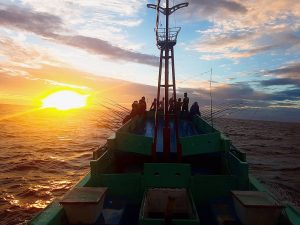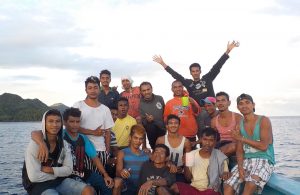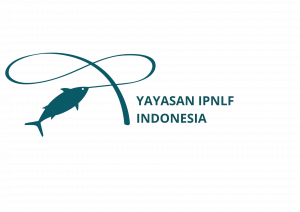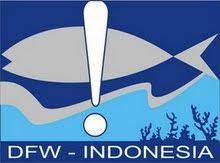The International Pole & Line Foundation (IPNLF) and Destructive Fishing Watch (DFW) have recently signed an MoU to support responsible one-by-one tuna fisheries in Indonesia. This MoU sees IPNLF and DFW commit to joint activities that will improve the social safeguards in place for Indonesian fishers.
 Indonesia is the world’s largest tuna supplier producing approximately one million tons annually. A large part of that volume is caught by traditional one-by-one fishing methods. The social benefits of these fisheries are closely associated with coastal communities and underpin local livelihoods, employment opportunities and food security. As such, securing, safeguarding and building opportunities for Indonesian coastal communities to participate in highly competitive global seafood markets is a key area of IPNLFs work. This new partnership helps advance IPNLFs aspiration to go beyond ensuring minimum social protections are in place, towards increasing human well being and improving the quality of life of the fishers they represent.
Indonesia is the world’s largest tuna supplier producing approximately one million tons annually. A large part of that volume is caught by traditional one-by-one fishing methods. The social benefits of these fisheries are closely associated with coastal communities and underpin local livelihoods, employment opportunities and food security. As such, securing, safeguarding and building opportunities for Indonesian coastal communities to participate in highly competitive global seafood markets is a key area of IPNLFs work. This new partnership helps advance IPNLFs aspiration to go beyond ensuring minimum social protections are in place, towards increasing human well being and improving the quality of life of the fishers they represent.
Through this new partnership, IPNLF will support the work of DFW by; conducting trainings that improve fishers knowledge of their own rights, establishing Fisher Information Centres in ports that allow fisher to submit labour complaints in-person, and ensuring DFWs National Fishers Centre (NFC) grievance mechanism is integrated into all of our Indonesian FIPs.
Support, develop and promote Indonesian pole-and-line, troll and handline (collectively known as ‘one-by-one’) tuna fisheries and their reliant communities.
Collaborate on policy development initiatives that support fisheries management efforts in Indonesia.
Harmonise social and environmental data collection efforts aimed at supporting Indonesian one-by-one tuna fisheries improvements and robust fishery management.
Provide trainings that improves the knowledge and skills of fishing vessel crews.
Ensure fair employment and safe working conditions on board for all crew working on fishing vessels operating within Indonesia one-by-one tuna fisheries.
Provide education and technical support to fishing vessel crews of their rights, access to legal support, and access to a grievance mechanism through the National Fishers Centre (NFC).
“Making sure fishermen are aware of their rights and have the means to report any issues they face should be an essential part of all fishing supply chains. Thanks to the work of DFW to date, Indonesian fishers have access to a system where their grievances can be reported to be dealt with. We are excited to contribute to this important work by ensuring that fishers gain a greater understanding of their own rights, and become more aware of the benefits of engaging with the grievance mechanism that has been made available for them to use”
— Maskur Tamanyira
Fisheries Specialist, IPNLF

“The protection of tuna fishermen needs to be carried out by all parties in the supply chain from upstream to downstream. To achieve this we encourage tuna business actors to jointly promote the protection of social aspects for tuna fisheries in Indonesia through awareness, campaigns and education. We are grateful for IPNLFs support of our work to date and their commitment to help ensure fishers become more aware of their rights and benefit from the grievance mechanism provided through our National Fishers Centre.”
— Mohamad Abdan Suhufan
National Coordinator, DFW
About IPNLF
 The International Pole and Line Foundation (IPNLF) promotes the sustainable management of the world’s responsible pole-and-line, handline and troll (collectively known as ‘one-by-one’) tuna fisheries while also recognising the importance of safeguarding the livelihoods they support.
The International Pole and Line Foundation (IPNLF) promotes the sustainable management of the world’s responsible pole-and-line, handline and troll (collectively known as ‘one-by-one’) tuna fisheries while also recognising the importance of safeguarding the livelihoods they support.
IPNLF was officially registered in the United Kingdom in 2012 (Charity 1145586), with branch offices in the UK, South Africa, Indonesia, The Netherlands, and the Maldives.
 About DWF
About DWF
Destructive Fishing Watch Indonesia (DWF) is a non-governmental organisation that is concerned with Illegal, Unreported and Unregulated (IUU) fishing, sustainable fisheries, poverty reduction and climate change mitigation through efforts and activities to empower and educate coastal communities and fishers, research and studies and provide policy recommendations to the government.